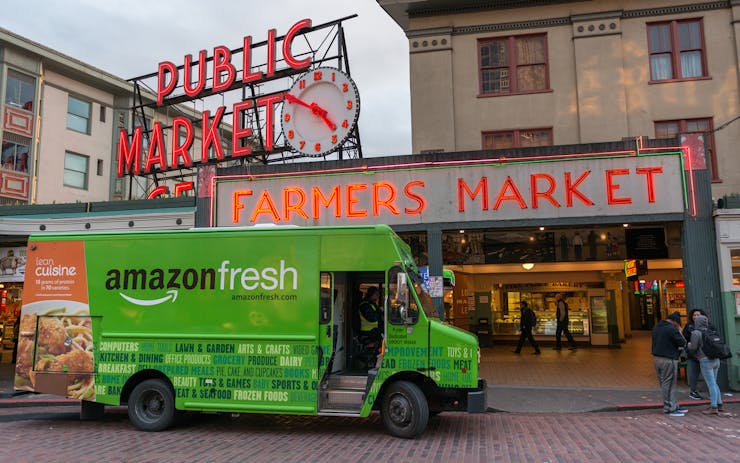Will legal cannabis soon be as easy as point, click, and wait by the door for the delivery guy?
Online shopping is a future that many in the adult-use industry are eager to embrace.
That’s a scenario being pushed in an intriguing new report by VolteFace, a UK drug policy think tank. Though focused mainly on the United Kingdom, where popular pressure is building for legalization, the report makes a fairly compelling case for the “virtualizing” of the global cannabis business—where all products are ordered online and delivered directly to the consumer, without the inefficiency or social risks of a bricks-and-mortar shop. Report author Mike Power, the UK journalist who wrote Drugs 2.0: The Web Revolution That’s Changing How the World Gets High, writes that it’s the only sensible future for mega markets like Canada and the United States.
Power writes: “A controlled and regulated online market is both essential and long overdue in order to protect users from the risks of the illicit market; to limit access to younger users; to offer safer products and increase consumer choice; to develop less harmful products and safer routes of administration; and to control marketing and advertising in any eventual legal context.”
A digital-only cannabis market, he adds, “would protect children, and limit their access to cannabis, but allows adults to make their own informed health choices.”
Already Working: Eaze, Tweed, and Others
It’s a compelling vision for the future of cannabis, to be sure. Beyond the element of convenience, such a digital-only marketplace does seem to address many of the concerns that regulators have, in everything from product safety to more efficient tax collection.
More to the point, it’s a future that much of the cannabis marketplace itself is also quite eager to embrace.
In California, for example, online delivery platforms like Eaze already offer tightly controlled app-based ordering and direct-to-your-door delivery for medical cannabis, and are anxious to expand the service to adult-use cannabis, which state voters approved last year. In the Eaze model, the company is simply a branded intermediary that coordinates deliveries from local dispensaries via a fleet of Uber-like drivers.
In Canada, meanwhile, players such as Tweed Mainstreet have created vast mail-order systems whose massive inventory and short delivery times are almost Amazonian in their efficiency and scope.
Constrained For Now, But Not For Long
True, these early movers in the virtualization space face constraints. Eaze, for example, is currently allowed to work only in California. Tweed is, of course, limited to Canada. But investors who have poured millions of dollars into these players clearly believe that the virtualization model can readily expand into other states and, eventually, to the continent as a whole.
'It's a matter of flipping a switch. We can expand tomorrow.'
“We can scale extremely fast,” Keith McCarty, then CEO of Eaze, explained to Cannainsider last year. That’s true in part because the company is itself largely virtual: its delivery network is built on top of the existing retail and wholesale networks that are already in place in a given market area. “For us it’s really just a matter of flipping on a switch,” McCarty said. “We can expand tomorrow.”
These app enabled delivery-dispensary partnerships may well be just the first stage in a much larger transformation of the cannabis end-user experience. Given how rapidly the other segments of the cannabis industry, most notably production, are being disrupted by business models centered on scale volumes and technology-driven cost reductions, it seems inevitable that the retail side will also be transformed. Just as bricks-and-mortar retailing has been decimated by an online model that offers low-cost two-day delivery, so, too, the huge network of dispensaries that has followed legalization and decriminalization may itself be but a stage in the cannabis industry’s accelerating evolution.
Shop highly rated dispensaries near you
Showing you dispensaries nearAmazon Cannabis Prime? Not So Fast.
Not that we’ll be seeing cannabis offered as part of Amazon Prime any time soon. No doubt much of the cannabis trade will eventually migrate from the physical market into the virtual one, particularly in product areas, such as low-cost edibles, that are more and more like commodities. But it’s far from clear how far this transformation will go, or how long it will take.
Virtualization is already a reality in Canada’s medical marijuana market, where patients click-through their purchases and receive medicine in the mail. But it’s a different story in the United States. Even before the election of Donald Trump, online entrepreneurs faced a market that was fragmented among cannabis-friendly and unfriendly states, and even among pro- and anti- local governments within states. That’s hardly the best environment for the emergence of an Amazon-esque cannabis company.
Since the appointment of Trump’s cannabis-loathing attorney general, Jeff Sessions, even first movers in the virtualization space seem to be reassessing their expansion plans. As Jim Patterson, Eaze’s new CEO, told The San Jose Mercury News last month, “I think what a lot of people are doing is waiting and seeing.”
More fundamentally, the virtualization model makes some assumptions about the existing cannabis retail segment that may not bear out entirely. The VolteFace report, for example, assumes that physical dispensaries are so problematic socially (magnets for “antisocial behavior…. public consumption and intoxication”) that consumers will abandon them as soon as a virtual option is available. Yet given the way many new, higher-end dispensaries are emphasizing a rich consumer experience, with experts on hand to assist in selection, and spa-like ambience—it’s hardly clear that the bricks-and-mortar cannabis model is going extinct tomorrow.
To the contrary, just as independent bookstores have made a comeback from an assumed Amazon-led extinction—in part by offering a hands-on, in person experience that is simply unavailable online—there is every reason to believe that some form of the bricks-and-mortar cannabis experience will survive even in the age of the virtual high.





